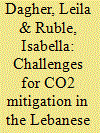| Srl | Item |
| 1 |
ID:
094251


|
|
|
|
|
| Publication |
2010.
|
| Summary/Abstract |
Similar to other developing countries the electricity sector in Lebanon is monopolized by a vertically integrated public utility, Electricite Du Liban (EDL). EDL's supply is characterized by frequent and lengthy power cuts that have given rise to an alternative, informal, and unregulated backup sector, which serves to satisfy electricity demand during the extended blackout periods. This paper examines the evolvement of the backup sector and its related CO2 emissions via the use of scenario analysis. The economic and energy policy implications of each scenario are discussed and a number of policy options are presented to ensure that the growth in CO2 emissions is contained. Results clearly indicate that the backup sector plays a critical role in the success of any greenhouse gas mitigation commitment undertaken by Lebanon. A clear strategy on dealing with this sector needs to be devised simultaneously if not prior to any climate change policy at the national level.
|
|
|
|
|
|
|
|
|
|
|
|
|
|
|
|
| 2 |
ID:
117273


|
|
|
|
|
| Publication |
2013.
|
| Summary/Abstract |
Lebanon's energy sector crisis leads to a lack of access to uninterrupted, basic modern electricity services that affects all sectors of the economy. Energy conservation measures are nearly inexistent yet they can potentially lead to substantial reductions in energy demand growth, environmental damages and public expenditures. This paper presents an analysis of the costs and benefits associated with the introduction of mandatory standards for energy efficiency for four different household appliances (refrigerator/freezers, AC split units, washing machines and lighting) over the period 2013-2027. Our results show potential savings in electricity consumption reaching 2054 GW h annually in 2027 as well as a reduction of subsidies paid to the public utility of 3.6 billion USD in 2027 while CO2 emissions avoided amount to 8.9 million tons over the period of analysis. Furthermore, we propose a financially attractive refrigerator/freezer replacement program for low income households. If this program would cover all existing low-income households in 2013, the savings in electricity consumption would lead to a reduction in subsidies of 9 billion USD (NPV) over the period 2013-2027, while full funding for this program would cost the government 223.8 million USD. This program would thereby benefit consumers, the government and further economic development.
|
|
|
|
|
|
|
|
|
|
|
|
|
|
|
|
| 3 |
ID:
104906


|
|
|
|
|
| Publication |
2011.
|
| Summary/Abstract |
Over the past decades Lebanon's energy sector has been largely ignored and this has led to high economic and environmental costs. The sector is characterized by electricity poverty, an expanding and mainly unregulated transport sector and a lack of energy savings spanning through all sectors of the economy. Recently, the Government of Lebanon has committed to increase the share of renewable energy to 10% of the total energy supply by 2013 and to 12% by the year 2020; it also aims at reducing energy consumption by 6% by the year 2013. This paper aims at contributing to the formulation of a more comprehensive energy strategy for Lebanon by analyzing the recent changes in policy direction and by recommending legal, regulatory and policy measures in order to transform current shortcomings into opportunities allowing the country to become a regional 'success story' in the deployment of renewable energy and energy efficiency.
|
|
|
|
|
|
|
|
|
|
|
|
|
|
|
|